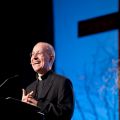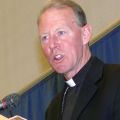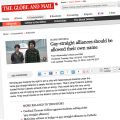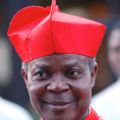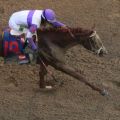In Calgary, eternal fatherhood is made manifest once more
CALGARY - Four new priests were ordained here on the Feast of Sts. John Fisher and Thomas More, a most grace-filled day for the diocese of Calgary in its centenary year. It was a blessing for me to be on hand to witness some family friends ordained, and then later to join in the joy of a First Mass at my home parish of St. Bonaventure.
Priestly ordinations are rather fewer than we need these days, so to have four young men is remarkable, all the more so as they all came from local parishes. Their vocation stories are a combination of old patterns and new ones. Two went almost straight from high school, the others after some time working. Their vocations were nourished in Catholic families and inspired by good priests. As is common today, World Youth Day had a significant impact too.
American Jesuit James Martin can find the humour in the Church
Jesuit Father James (Jim) Martin is quickly becoming one of my favourite religious writers and orators. And the more I read of his works or watch his talks on TV and the Internet, the more impressed I become.
This American Jesuit thinks clearly, speaks and writes directly, and best of all, he is funny, although he has serious messages. (He is the official chaplain of Comedy Network’s The Colbert Report where he sometimes appears.) He is a populist who endeavours to make Catholicism ever more popular.
If you’re looking for summer reading, Fr. Martin has several best-selling books, including My Life With the Saints, A Jesuit Off-Broadway: Centre Stage with Jesus, Judas and Life’s Big Questions, and the Jesuit Guide to Almost Everything.
- By Robert Brehl
My misgivings about Dublin congress leave me just a little embarrassed
I was a little embarrassed watching the coverage of the International Eucharistic Congress (IEC) in Dublin. Not because of anything that went on in Ireland, but rather because of my original attitude toward the congress being held there at all. Yet watching the pilgrims from around the world gathering in Dublin, I saw that their gestures of sympathy and solidarity were better than an attitude of ostracism and punishment.
When it was announced in 2008 at Quebec City that the 2012 IEC would be in Dublin, I was rather dismayed. I understood that sometimes a local Church in distress can be buoyed by such an international event — after all, that was the logic of having the IEC in Quebec City to begin with, to administer an emergency transfusion to the anemic local Church. Yet Dublin struck me as a step too far. After all, it would be hard to find any place where spectacular incompetence had brought the Church into greater crisis than in Ireland. And Irish society as a whole, led by its government, was hardly better.
Laity must join bishops in answering affronts to the Church
I cannot abide bishop bashing.
The habit in some Catholic circles of remorselessly denouncing and denigrating our prelates for perceived failures to lead, to act, to show courage, to boss the world about, sets my teeth on edge.
It is difficult to imagine a role outside the world of electoral politics that requires a broader back, a thicker skin and a finer ability to manage expectations than that of a North American Catholic bishop in 2012.
Are northern efforts coming at the expense of the new evangelization?
WHITEHORSE, YT - Last week I wrote about my impressions of the Yukon on my first trip to Canada’s north. In many ways it is altogether different from anything I have previously encountered in Canada’s cities, or even in my parish on Wolfe Island. At the same time the Yukon raises questions that the Church in all of Canada must face.
It is frankly astonishing that anyone lives in some of these remote communities, where a summer visitor is impressed by the natural beauty but year-round residents have to cope with isolation and lack of services, to say nothing of the severe cold and oppressive darkness of the punishing winter. To imagine living up here in the early 20th century, before roads and four-wheel drive trucks and propane gas heating and food preservatives is mindboggling, especially given that an overland trek of several weeks would deliver one into the Okanagan, one of the loveliest climates anywhere in the world.
Doggone it if I’m going to play God
They say you can’t teach old dogs new tricks, and that may be so.
But there is something special about an old dog, and he (or she) can often teach an owner a thing or two. Puppies are adorable, but old dogs are like comfortable shoes that when slipped on can sometimes walk us to unexpected places.
(If you’re not a pet lover, I implore you to stop reading immediately and move onto something else in The Register. These meanderings from a sappy dog lover will only frustrate you.)
- By Robert Brehl
The ‘Real’ in our reality
Most of us wish the title of Greg Wolfe’s book Beauty Will Save the World could come true.
But few of us would automatically agree with the argument made in Italian dramatist Romeo Castellucci’s newest work — On the Concept of the Face, Regarding the Son of God — that even human waste can serve the faith.
The challenging capacity of Canada’s far north
WHITEHORSE, YUKON - On my first visit to Canada’s territories, and the farthest north I have ever travelled on the globe, I was even more curious than I usually am, and asked a lot of questions of those who were kind enough to meet me. One word kept being repeated in almost every answer: “capacity.” The bishop of Whitehorse explained the importance of it, the premier of the Yukon emphasized it, a young couple raised it in relation to housing, an aboriginal shop-owner mentioned it in terms of suppliers — even the receptionist at the local newspaper spoke of it in terms of the newsroom.
Media coverage of GSA controversy veers off-topic
The long-running controversy concerning Ontario’s anti-bullying legislation has been covered by the media from the beginning with varying degrees of accuracy. But for inciting a string of negative coverage about Catholic schools and the Church in general, few events match coverage of the Ontario government’s May 25 announcement that all schools must provide gay-straight alliances if requested by students, followed by media reaction to statements from Cardinal Thomas Collins and other Catholic educators.
“Toronto’s Catholic Cardinal has a mistaken view of religious freedom,” thundered The Globe, editorializing that the cardinal’s viewpoint — that Catholic schools should be free to combat bullying in a manner consistent with Catholic teaching — is out of keeping with modern constitutional rights, and “public money should not be put toward discriminatory uses.”
Nigerian Catholicism at forefront of universal Church
There is a new archbishop in Lagos, Nigeria’s largest city. That might not strike you as big news, but it is. The last time Lagos had a new archbishop was in 1973. Cardinal Anthony Okugie, now 76, retired in May after an astonishing 39 years as archbishop. His successor, Archbishop Alfred Martins, is already 52, so likely will only serve for about 25 years or so.
In the four decades since Cardinal Okugie was appointed, Nigerian Catholicism has come to the forefront of the universal Church. Nigeria’s explosive growth, its sending of missionary priests to the dying Churches of Europe and North America, and its face to face confrontation with militant Islam all have lessons to teach Catholics the world over.
Pony up for a good memory at the Triple Crown
Should the Canadian-owned racehorse I’ll Have Another pull off one of the rarest feats in sports next weekend and win the Triple Crown, I am sure it will evoke a memory of Holy Cross Elementary School in east-end Toronto and an affable nun who used to be the principal.
I’ll Have Another is the plucky thoroughbred owned by Windsor, Ont., native J. Paul Reddam and ridden by an underdog jockey named Mario Gutierrez, who earned his spurs at the racing outpost known as Hastings Park in Vancouver.
- By Robert Brehl



